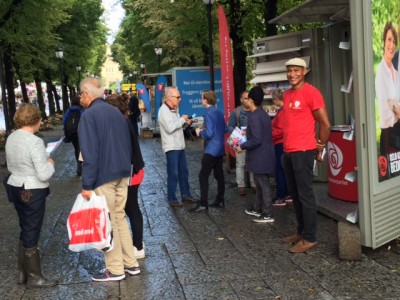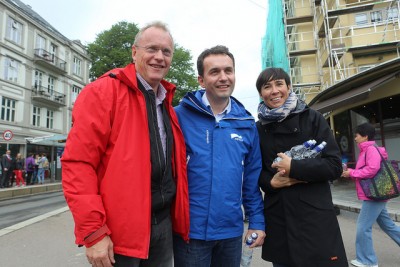After several weeks of intense debate and campaigning, the main issues to be decided in Monday’s mid-term municipal elections in Norway involve property tax, elder care, how to accommodate refugees and whether municipalities should merge. Public opinion polls show that in many cities, the races are so tight that only a few hundred votes can decide the outcome.

The municipal elections are important, because it’s the local governments that decide how state-allocated funds are spent on the vast majority of social welfare services, and how local funds are raised. The local governments run Norway’s schools, nursing homes, day care centers for children and a host of other social services in addition to the basics like sewer systems and street cleaning. That’s why there can be wide variations in services from town to town, because local governments decide how they think public funds should be raised and spent.
The hottest single issue in Norway’s capital, meanwhile, is whether Oslo residents should start paying property tax. A separate local tax on the value of residential and commercial real estate has long been imposed in other communities around the country, but not in Oslo. That’s now basically up to the voters.
It would be political suicide in many places, not least the US, to head into an election with a promise to impose new taxes, but that’s exactly what the Labour Party is doing in Oslo. Norway’s biggest city, which has been under the control of conservative coalitions for nearly two decades, is one of the few to have resisted imposition of property tax. Now Labour thinks it’s necessary to improve elder care and expand capacity at nursing homes, not least as the ranks of the elderly grow.

Labour has promised to earmark more than a billion kroner of revenues raised through a new property tax for elder care, with the rest of the money going towards increasing day care capacity for children. Labour’s plan is being fronted by the party’s candidate to head city government in Oslo, Raymond Johansen, a former state secretary in the foreign ministry who most recently held the powerful post of the Labour Party national secretary before he decided to run for office himself.
Under Labour’s plan, around NOK 1.2 billion would be raised through new tax on residential real estate, but with a standard deduction so high (NOK 4 million) that most homeowners would avoid it, because it would be subtracted from 80 percent of market value. That means nearly all homes valued below NOK 5 million would avoid the tax, leaving around 20 percent of Oslo homeowners needing to pay it.
Newspaper Dagens Næringsliv (DN) reported last week, though, that taxing such a small portion of the city’s population may violate a state law that calls for taxes to be more evenly spread. That would require reducing the standard deduction to NOK 2.55 million, which in turn would extend the tax to more residents, and more of Labour’s voters.

The strongest opposition to Labour’s proposed property tax in Oslo comes from commercial property owners, though, who would get hit to the tune of NOK 1.4 billion. Johansen aims to tax business property at a rate of 0.003 percent of market value, similar, he claims, to “what the Conservatives have done in Bergen, but cheaper,” since Bergen’s commercial property tax rate is 0.005 percent. Business leaders and commercial property owners are nonetheless complaining already and threatening to simply pass the cost of the tax, if approved, on to tenants.
Money raised will be earmarked to fund 500 new full-time jobs within the elder care sector and provide for 3,000 more children at day care centers. Labour faces challenges implementing its own plan, though, if it fails to win a majority of seats on the Oslo City Council. Johansen “shocked” other parties’ candidates by saying that he, as the only candidate to lead a left-leaning city government coalition, would only guarantee for Labour’s own model for property tax. The implication that he would ignore models proposed by potential political partners was not warmly greeted.
‘Wrong medicine’
The conservative incumbents in Oslo, meanwhile, are campaigning almost entirely on a promise not to impose property tax. The Conservative Party’s candidates for mayor (Fabian Stang) and city government leader (Stian Berger Røsland) have blanketed the city with brochures and posters warning that businesses and homeowners can be hit by property tax if they vote for Labour, the Socialist Left (SV), the Reds or the Greens. The Conservatives (Høyre) are billing themselves as “guarantors” against property tax.
“Property tax on business property is the wrong medicine in an expensive city, the wrong medicine in uncertain times,” the incumbent city government leader in charge of business and cultural issues, Hallstein Bjercke of the Liberal Party, told DN. “It will make it even more expensive for everyone who runs a business in the city. The last thing they need now is higher costs.”
Bjercke, Røsland and Stang seem confident Oslo will raise the revenues it needs for elder care and day care in other ways. Their Conservative colleagues in cities from Bergen to Haugesund to Lillesand weren’t able to, though, and have imposed property tax in their communities. Others warn that once property tax is imposed, communities become dependent on it, and it’s hard to remove it.
“It’s like narcotics,” Glenn Ellingsen of Rakkestad, a small town in Østfold County, told newspaper Aftenposten recently. He tried mounting a campaign to repeal Rakkestad’s property tax, which costs him NOK 10,000 a year, but it fizzled. Several of Østfold’s larger cities including Moss, Fredrikstad and Sarpsborg have property tax, while some of his neighbouring towns like Eidsberg and Skiptvet don’t.
Now Ellingsen has given up on efforts to avoid property tax. “I don’t have any faith that politicians would manage to repeal property tax, no matter which party I vote for,” he said.
newsinenglish.no/Nina Berglund

